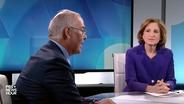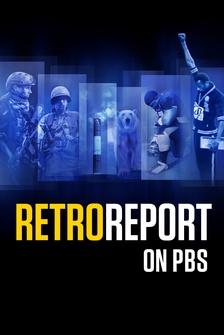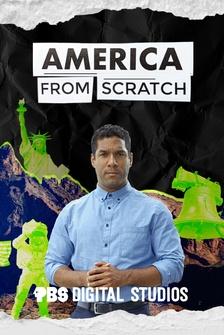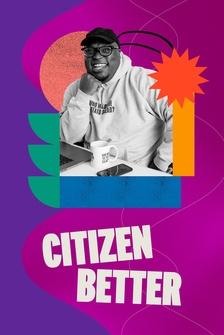GEOFF BENNETT: And we're going to shift our focus now to a busy week in politics, as a major abortion decision out of Arizona weighs on the minds of some voters and Republicans on Capitol Hill navigate their agenda with influence from Donald Trump.
For more, we're joined tonight by New York Times columnist David Brooks and Ruth Marcus, associate editor for The Washington Post.
RUTH MARCUS, Associate Editor, The Washington Post: Hi.
GEOFF BENNETT: Thank you both for being here.
So, Vice President Kamala Harris is in Arizona tonight highlighting reproductive rights just days after that state's Supreme Court ruled that a near-total abortion ban from 1864 is enforceable.
Here's a bit of what she said.
KAMALA HARRIS, Vice President of the United States: Overturning Roe was just the opening act, just the opening act of a larger strategy to take women's rights and freedoms, part of a full-on attack state by state on reproductive freedom.
And we all must understand who is to blame.
Former President Donald Trump did this.
GEOFF BENNETT: So, Ruth, what do you make of this aggressive strategy by the Biden campaign to keep the abortion issue in the spotlight and pin Donald Trump as the architect of abortion restrictions in bans like the one in Arizona?
RUTH MARCUS: I think it's doubly smart.
Abortion is the gift, and this is an odd way to say it, but it keeps on giving politically for Democrats.
It's an odd way to say it, because, obviously, removing abortion rights from American women has affected many women's lives and caused a lot of damage.
But, politically, for Democrats, it has been, I think, beyond their wildest dreams.
And they keep getting help from states who do crazy things, in particular from conservative state Supreme Courts, like we saw in Alabama with the IVF case, like we saw in Florida, where they cleared the way for a six-week ban, and like we saw this week in Arizona with a very draconian ban.
And so I think it is clear that voters are not happy with things this extreme, and it is perfectly fair to put a lot of this on Donald Trump's lap.
And if I were Democrats, I would be asking him questions like, OK, if you are president, will you enforce the Comstock Act and stop abortion that way?
If you were president, would you remove mifepristone, the abortion pill, from being able to be marketed?
Those are really good questions and hard for him to answer.
GEOFF BENNETT: Well, what about that, David?
Because even Donald Trump is implicitly acknowledging that this is a problem, because he said that the Arizona State Supreme Court went too far and that the law, in his words, needs to be straightened out.
DAVID BROOKS: Yes, well, this is a phenomenal shift in the Republican Party we saw this week.
Since Ronald Reagan, the Republican Party has been a pro-life party.
It's been based on the conviction that, from conception, it's a human life.
It's a human life.
And then you get Donald Trump.
And, recently, he's been floating the idea that we should have a 15-week ban or a 20-week ban.
In other words, he's for allowing a law that has 93 -- or some 90 percent of the abortions would go forward, and he's allegedly pro-life.
Now he's sort of backed off that position.
His position is, it should be state by state.
But he won't tell people how they should vote.
He says, follow your heart.
This is literally the most pro-choice position a Republican has taken since Ronald Reagan, going back to Jerry Ford maybe.
And so you're seeing the party bend to the political winds.
And it's just an astonishing turnaround.
And the thing that astonishes me, the pro-life groups, they should be really, I guess it's appropriate to say raising holy hell.
But they're sort of going along with it.
And it shows that -- the power of Trump over the party.
Let's protect Donald Trump, even above some of the core convictions.
Will it shift election, the presidential election?
I'm not so sure.
I think it's definitely helped Democrats in House races and it's definitely helped Democrats in every ballot initiative since Dobbs.
But if you look at people in Arizona say, what are the issues they care about?
Inflation and immigration are number one and two, and they vastly prefer Donald Trump.
Abortion is in there, but it's down below.
So will it affect the -- it'll certainly drive Democratic turnout, but will it shift toward Donald Trump?
I'm not sure, since the two big issues, he's pretty good on.
GEOFF BENNETT: What do you think about that?
RUTH MARCUS: Two words, suburban women.
We -- this is going to be a game of inches in the presidential election, and inches in particular states.
And so when you have things like this, when you have young people who might not be that enthusiastic about getting out to vote for President Biden, this could get them off their couches and into the polls.
DAVID BROOKS: It could be.
Arizona was super, super close.
RUTH MARCUS: I want to say one quick thing about the concept of the 15- or 16-week ban.
This is a crock, because, at least the way the anti-abortion groups have peddled it, it would be a ceiling.
You couldn't have abortion after that.
But it would still leave Arizona to Arizona and South Dakota to South Dakota and have complete bans.
So that sounds a lot better than it is in practice, from my point of view.
GEOFF BENNETT: Well, House Speaker Mike Johnson, the country's most powerful elected Republican, he -- who is trying to save his job, which is under threat from Trump-aligned members of Congress, he was actually at Mar-a-Lago today standing alongside the former president.
The two are apparently teaming up to promote a bill to keep noncitizens from voting in federal elections, although we should say it's already illegal for noncitizens to vote in federal elections.
What should we make of their appearance today, Ruth?
RUTH MARCUS: Well, they kind of need each other, but one needs -- Johnson needs Trump more than he needs Johnson.
And he is in a very, very shaky situation.
If Donald Trump were to cast a baleful eye on him and want him out, he would be gone in a nanosecond.
You can see this in the impact on the FISA bill, which limped across the finish line in a slower way.
You can see this with Ukraine aid.
You can see it on a day-to-day basis.
So this is just a sort of silly dog-and-pony show, as you say, to suggest that -- first of all, that there is some huge problem -- there isn't -- of people who aren't authorized to vote voting.
People just want to make it harder to vote who don't think voters are going to go in their direction.
But this is a team that will last together as long as it is in Donald Trump's interest for it to last, and no longer.
GEOFF BENNETT: Well, the former president in his public remarks seemed to nod to Speaker Johnson's political problems.
Take a look.
DONALD TRUMP, Former President of the United States (R) and Current U.S. Presidential Candidate: We're getting along very well with the speaker.
It's not an easy situation for any speaker.
I think he's doing a very good job.
He's doing about as good as you're going to do.
And I'm sure that Marjorie understands that.
She's a very good friend of mine.
And I know she has a lot of respect for the speaker.
GEOFF BENNETT: So, when Donald Trump says Marjorie, he's referring, of course, to Marjorie Taylor Greene, the congresswoman who issued that motion to vacate.
Interestingly, Politico reported that it was Speaker Johnson's office that requested this appearance.
It wasn't the Trump campaign's or the Trump team's idea.
What do you -- what's your assessment of this?
DAVID BROOKS: Well, I think they understand you have to massage Donald Trump and say -- be nice to him, so he will be nice to you.
So they're trying to do the flattery thing.
But their interests are fundamentally misaligned.
Trump benefits every time something goes bad in Washington.
And it's to his detriment every time something goes nicely in Washington.
And so Johnson wants to pass stuff, and they're fundamentally misaligned.
I have to give Johnson some credit.
He's still hanging in there in Ukraine, which to me is the number one thing he needs to do is to get that vote to the floor.
And he's still working with the Biden administration.
And I think they're going to get there.
And that -- I give him credit and respect for doing that, against Donald Trump's influence.
GEOFF BENNETT: It's interesting that you raised that because I was texting with some Republican sources today who said that standing next to Donald Trump gives him cover to bring Ukraine to the floor and also keep his job.
Do you buy that?
RUTH MARCUS: Maybe.
Marjorie, I'm sure, has a lot of respect for him.
We will see how long that assertion lasts.
(LAUGHTER) DAVID BROOKS: Yes.
RUTH MARCUS: I do think that there's one way in which they are aligned in the right way, which is, if Donald Trump becomes president, he needs to have a Republican House.
And so to the -- I understand your -- I take your point about chaos in Washington is good for Donald Trump, but too much chaos in the House is not so good for a future President Trump.
DAVID BROOKS: That's fair.
GEOFF BENNETT: Well, there could be some chaos in New York City on Monday, because that will be the start of Donald Trump's criminal trial.
He faces 34 felony charges for falsifying business records stemming from a $130,000 payment during the 2016 presidential campaign to adult film star Stormy Daniels.
What will you be watching for as this case begins and progresses?
DAVID BROOKS: I guess Donald Trump's prefrontal cortex.
(LAUGHTER) DAVID BROOKS: I want to know how much self-control he has.
And so he's going to be in there.
A lot of people he doesn't like are going to be testifying right in front of him.
He's going to be tempted to storm out.
He's going to be tempted to scream.
And that will alienate the jury and the judge.
And so I'm more watching to see how he comports himself.
GEOFF BENNETT: We have seen Donald Trump actually benefit politically from all of these legal troubles.
Does that -- will this change?
Will the resonance and the impact change now that this is a criminal trial, the first of four that is actually getting under way?
RUTH MARCUS: I have a complicated answer to that question.
This is a case that makes me the most nervous for kind of for the reason that you say.
It is the shakiest case legally.
It's a case about falsification of business records that doesn't quite have the resonance of interfering with an election or obstructing justice and mishandling classified information.
It involves some serious things.
Trump tried to keep salient information from voters at a time when he was in potential trouble because of the "Access Hollywood" tape.
But I do think that, when you see a criminal trial and, in particular, if we do see a criminal conviction, which is more likely than not -- this is a Manhattan jury -- that that really could have an impact in a way that Trump has not been used to.
The criminal charges against him, he won't look as much of a victim as he will look if he's convicted like a felon.
GEOFF BENNETT: How do you see it?
DAVID BROOKS: I think it's more or less - - I wish this case were not going first, because it may -- the stronger cases are further down the line.
But I -- there are polls clearly show, people say, if he's convicted, a significant sense - - chunk say, I will not vote for him.
I will believe it when I see it.
GEOFF BENNETT: All right, David Brooks and Ruth Marcus, appreciate you both.
DAVID BROOKS: Thank you.










